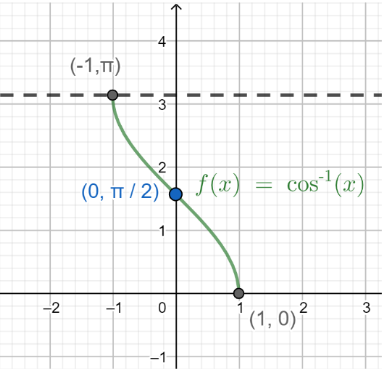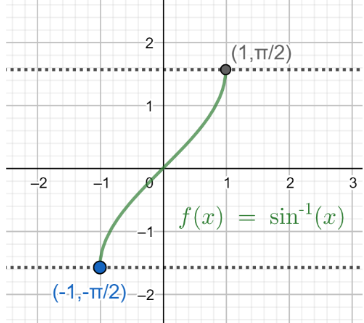Question
Question: What is the principal value of \({{\cos }^{-1}}\left( \cos \dfrac{2\pi }{3} \right)+{{\sin }^{-1}}\l...
What is the principal value of cos−1(cos32π)+sin−1(sin32π) ?
Solution
Hint: For solving this question first, we will go through some important aspects like domain and range of the inverse trigonometric functions y=cos−1x and y=sin−1x . First, we will use one of the basic formulas of the trigonometric ratio to write cos32π=−21 in the given term. After that, we will use one of the basic formula of inverse trigonometric functions, i.e. cos−1(−21)=32π to find the value of cos−1(cos32π) . After that, we will use formula sin32π=23 and sin−1(23)=3π to find the value of sin−1(sin32π) . Then, we will easily find the value of cos−1(cos32π)+sin−1(sin32π) .
Complete step-by-step solution -
Given:
We have to find the principal value of the following:
cos−1(cos32π)+sin−1(sin32π)
Now, we will find the principal values of cos−1(cos32π) and sin−1(sin32π) separately and then, we will add them to find the principal value of cos−1(cos32π)+sin−1(sin32π) .
Calculation for the principal value of cos−1(cos32π) :
Now, before we proceed we should know about the inverse trigonometric function y=cos−1x . For more clarity look at the figure given below:

In the above figure, the plot y=f(x)=cos−1x is shown. And we should know that the function y=cos−1x is defined for x∈[−1,1] and its range is y∈[0,π] then, y is the principal value of cos−1x .
Now, we will use the above concept for giving the correct principal value of cos−1(cos32π) .
Now, before we proceed further we should know the following formulas:
cos32π=cos(π−3π)=−cos3π=−21..................(1)cos−1(−21)=32π...........(2)
Now, we will use the above two formulas to solve this question.
We have, cos−1(cos32π) .
Now, we will use the formula from the equation (1) to write cos32π=−21 in the term cos−1(cos32π) . Then,
cos−1(cos32π)⇒cos−1(−21)
Now, we will use the formula from the equation (2) to write cos−1(−21)=32π in the above line. Then,
cos−1(−21)⇒32π
Now, from the above result, we conclude that the principal value of the expression cos−1(cos32π) will be equal to 32π . Then,
cos−1(cos32π)=32π.....................(3)
Calculation for the principal value of sin−1(sin32π) :
Now, before we proceed we should know about the inverse trigonometric function y=sin−1x . For more clarity look at the figure given below:

In the above figure, the plot y=f(x)=sin−1x is shown. And we should know that the function y=sin−1x is defined for x∈[−1,1] and its range is y∈[−2π,2π] then, y is the principal value of sin−1x .
Now, we will use the above concept for giving the correct principal value of sin−1(sin32π) .
Now, before we proceed further we should know the following formulas:
sin32π=sin(π−3π)=sin3π=23.................(4)sin−1(23)=3π...........(5)
Now, we will use the above two formulas to solve this question.
We have, sin−1(sin32π) .
Now, we will use the formula from the equation (4) to write sin32π=23 in the term sin−1(sin32π) . Then,
sin−1(sin32π)⇒sin−1(23)
Now, we will use the formula from the equation (5) to write sin−1(23)=3π in the above line. Then,
sin−1(23)⇒3π
Now, from the above result, we conclude that the principal value of the expression sin−1(sin32π) will be equal to 3π . Then,
sin−1(sin32π)=3π.....................(6)
Now, we will use the result of the equation (3) and (6) to find the principal value of cos−1(cos32π)+sin−1(sin32π) . Then,
cos−1(cos32π)+sin−1(sin32π)⇒32π+3π⇒π
Now, from the above result, we conclude that principal value of the cos−1(cos32π)+sin−1(sin32π) is equal to π .
Thus, cos−1(cos32π)+sin−1(sin32π)=π.
Note: Here, the student should first understand what is asked in the question and then proceed in the right direction to get the correct answer quickly. Moreover, we should avoid writing sin−1(sin32π)=32π directly and use the basic concepts of domain and range of the inverse trigonometric functions y=cos−1x and y=sin−1x correctly. And after giving calculating the values of cos−1(cos32π) and sin−1(sin32π) , we should check for the validity of our answer by checking whether it lies in the range of its inverse trigonometric function or not.
